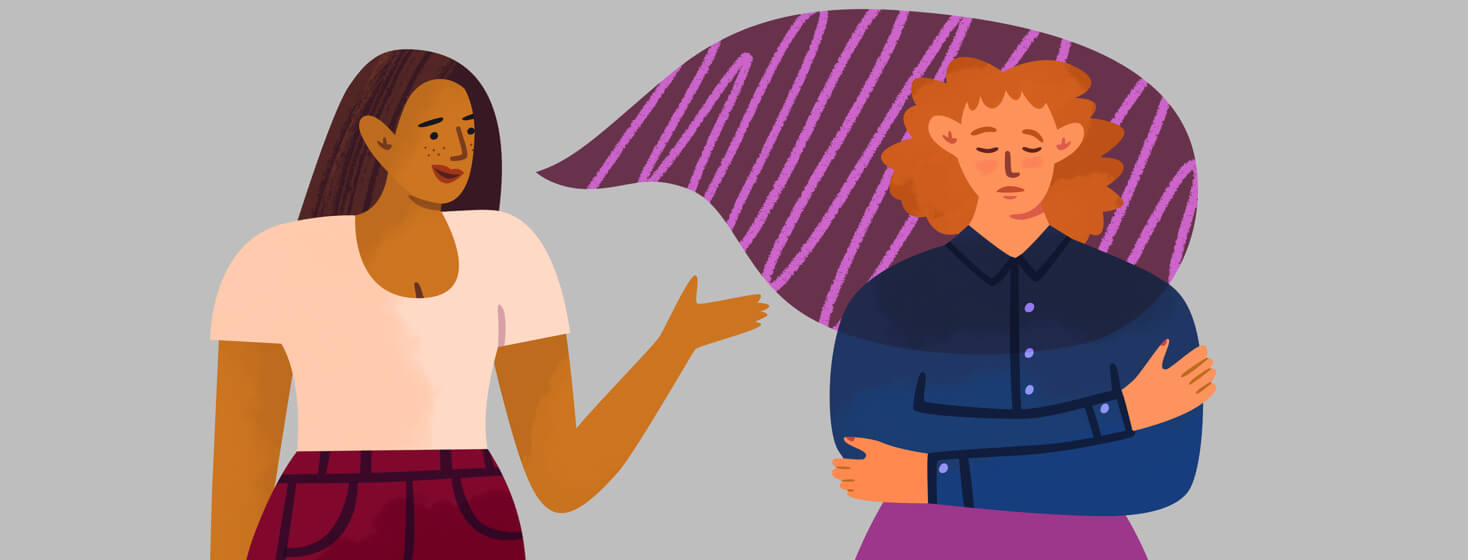Why Saying “It Could Be Worse” Is Not Helpful or Kind
If you have a chronic health condition, you’ve likely heard “it could be worse” more times than you’d like to count. Sometimes it comes from a loved one, from a friend, from a coworker, or we might even say it to ourselves when we’re feeling down.
“It could be worse” doesn’t make us feel better though, and there are far more loving phrases we could replace it with.
The many types of "it could be worse"
There are many variations of “it could be worse,” like “at least you can still […],” “at least it’s not […],” or “look on the bright side […].”
You might hear: "At least..."
- “...it’s only in your knees.”
- “...you can take naps during the day."
- "...you can still use your hands.”
- "...your rheumatologist listens to you”
- "...you have insurance."
- "...you have family nearby who can help.”
Iterations can even include: “at least you were able to get disability,” “at least you can afford a mobility aid,” or “at least you’re retired.”
Or maybe something like: “at least it’s not cancer,” “at least you’re not terminally ill,” “at least you’re still breathing” … which all translate to “it could be worse.”
"It could be worse" hurts
When you say “it could be worse,” what you’re actually saying is “stop complaining,” “you shouldn’t be so upset,” or “you shouldn’t feel this way.” These phrases turn our hurt and pain into something to feel shameful or guilty about.
These phrases dismiss our feelings and our symptoms; they diminish and belittle them. While the intent may have been to help us feel better, we actually feel selfish and judged. The fact that others are suffering terribly does not change the fact that we are sick.
It does not ease our discomfort, it simply piles on feelings of isolation and places the blame on us. It says you are only suffering because you’re not grateful enough. You are only suffering because you’re not positive enough.
The irony is, we deeply understand how much “worse” things can get. Many of us are mourning the life we had before it got worse. Knowing it could be worse does not relieve the pain, and it does not lessen suffering.
Suffering is not a competition
If someone tells you “it could be worse” and you explain how this phrase is hurtful, they may try to convince you that they were only trying to help you be more grateful. Maybe you tell yourself the same thing. Focusing on what’s good and positive in your life is very healthy, but blaming yourself for feeling pain, sadness, frustration, etc. is not healthy.
You don’t need to be ranked on some invisible scale of suffering before you are given permission to cry, to feel depressed, or to be upset that you can’t do the things you used to do. We all deserve to be given compassion, and this compassion should not be dependent on you falling favorably on some invisible hierarchy of suffering.
Being grateful is not about dismissing the difficult things in your life, it’s about mindfully giving thanks for your blessings. It comes from a place of kindness, not from a place of comparison.
Providing empathy and support
Now that we have established that pain and suffering are not a competition, what’s a healthier approach? To start, don’t minimize someone’s feelings, emotions, or symptoms. Acknowledge and be empathetic. Give love and support, unreservedly, and without judgment.
If this is difficult, take a moment to think about how much suffering is inherent in life, and how it’s something we all have in common. Think about moments or situations that have been challenging for you, and what would have been comforting for you.
How nice it would have been to have someone listen with love and to say “I’m so sorry that you’re hurting. I’m here for you.”
Being there for each other
Sometimes it’s uncomfortable to be present for the pain of others, and this is often why we reach for a response that will push this discomfort away. But acknowledging suffering is how we heal, and how we connect.
Let's try to replace "it could be worse" with "this sounds so difficult for you" and "I'm always here to listen if you need me."
What about you? Have friends, family, coworkers, or fellow community members told you "it could be worse?" How did you respond?

Join the conversation